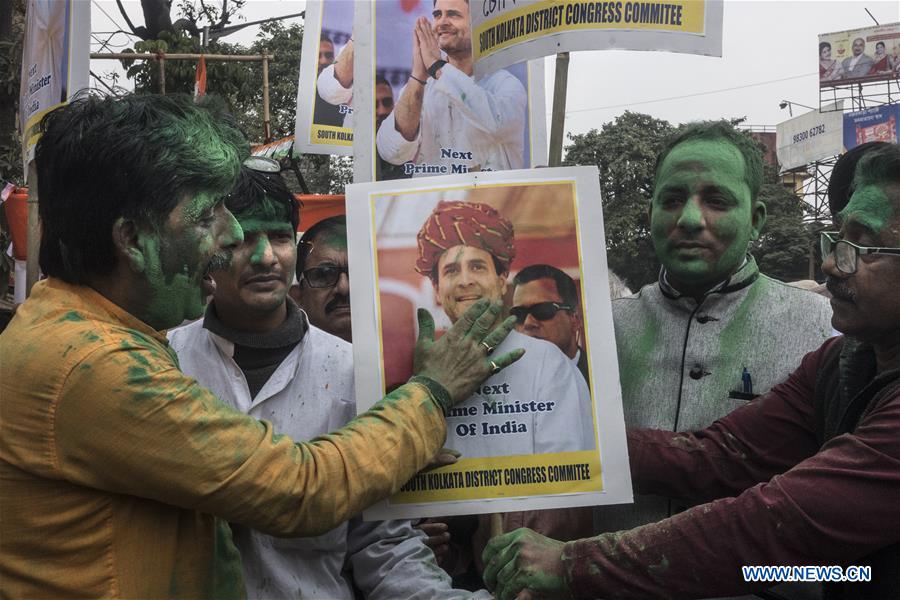
Supporters of the Indian National Congress (INC) celebrate election results in Kolkata, India, Dec. 11, 2018. After over 10 hours of continuous counting of votes in five states that went to polls recently, India's main opposition party the INC seemed comfortably positioned on Tuesday to grab three major states -- Madhya Pradesh, Chhattisgarh and Rajasthan, from the main ruling Bharatiya Janata Party (BJP). (Xinhua/Tumpa Mondal)
NEW DELHI, Dec. 11 (Xinhua) -- After over 10 hours of continuous counting of votes in five states that went to polls recently, India's main opposition party the Indian National Congress (INC) seemed comfortably positioned on Tuesday to grab three major states -- Madhya Pradesh, Chhattisgarh and Rajasthan, from the main ruling Bharatiya Janata Party (BJP).
The election results assume enough significance in India's polity even as political analysts believe that the results might have an impact on the outcome of next year's general elections.
The results are also taken as an indicator of rise in popularity, and political acceptance, of INC president Rahul Gandhi, who assumed the reigns of his party on Dec. 11 last year.
Rahul Gandhi is the son of former prime minister Rajiv Gandhi, grandson of former prime minister Indira Gandhi and great grandson of India's first prime minister Jawaharlal Nehru.
The counting of votes is still on and the final results are yet to be formally announced by the Election Commission of India (ECI).
The BJP ruled the states of Madhya Pradesh and Chhattisgarh for 15 years, and for the past five years in Rajasthan. Now, all the three states are to go to the Congress' kitty.
In Madhya Pradesh, which has a total of 230 Assembly constituencies, the INC is expected to win at least 115 constituencies, whereas BJP remains a close second with 106 seats. In Chhattisgarh, the INC seems to be winning 64 constituencies while the BJP is decimated with only 18 seats out of the total 90.
Chhattisgarh chief minister, who belongs to the BJP, told media that he had tendered his resignation to the state governor during the day.
In Rajasthan, the INC is expected to win nearly 102 constituencies out of the total 200, even as the BJP remains a distant second with wins in around 72 constituencies.
After ruling for a decade, the INC lost the state of Mizoram in the northeast India to a state-level political party. Out of the total 40 constituencies, the INC could manage to win just five while the state-level party Mizo National Front (MNF) is expected to win around 26 seats.
Political status quo was maintained in Telangana, even as the current ruling party -- the Telangana Rashtriya Samithi (TRS) won around 87 seats out of the total 119, and is comfortable to form its second consecutive government in the state.
Considering the polls results going against the BJP, senior politicians opposed to it (BJP) have already started describing it as the "beginning of the end of its rule", besides also forecasting its defeat in the next year's general elections, slated to be held in April-May.
In a sharp reaction to the BJP's defeat in three states, Chief Minister of eastern state of West Bengal Mamata Banerjee said that the just-concluded Assembly polls in five states were a semi-final ahead of the next year's "final" parliamentary polls.
Delhi Chief Minister Arvind Kejrival, who too is opposed to the BJP, said that the countdown had begun of the Modi regime.











